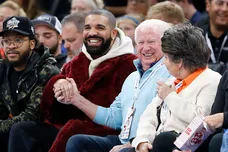Last year, a video of a distraught mother who had just heard Vince Staples' "Norf Norf" on the radio went viral. While hip-hop fans were quick to dismiss her criticisms of the song as conservative and over-dramatic, Vince came to her defense.
Following an interview about the video in which he later claimed he was misquoted, Vince clarified his views on Twitter. "What I was saying was that the woman in that video is clearly confused on the context of the song which causes her to be frightened," he wrote. "She also, in my opinion, seems to be emotionally unstable. With both those things being said, she has a right to her opinion. No person needs to be attacked for their opinion on what they see to be appropriate for their children. They have a right to it. This misunderstanding of our community leads to miscommunication which we should convert into a progressive dialogue."
6 months later, the video was brought up again in Vince's interview with NPR. This time, he shared a more detailed response, beginning with the declaration, "She was right."
What she said, "this is what our children are being exposed to"? She's right. That's what the song is about: what our children are being exposed to.
My question is, why can we listen to that and pass it off like it's not a problem? When you see a film and you see a murder scene or a rape scene or something that's displaying an element of trauma, we don't look at it and go, "This movie's f****** great, I'm having a great time, are you?" We feel for that. Know what I'm saying? But it doesn't necessarily happen in that sense when we're speaking about music. So I didn't make that song for it to make people happy. So I don't have a problem with what she said. You got a reaction — isn't that the point, essentially?
Vince later criticized the people who were quick to mock the woman upon seeing the video.
It's pathetic to attack someone for having an opinion or feeling some type of way, for wanting her children to not be exposed to something. 'Cause I'm 100 percent sure my mother would have loved for her children to not be exposed to gang life. The difference is it wasn't on the radio — it was in our house, and it was outside, and it was at our schools, and it was at our churches, it was everywhere that we were. So it was kind of a little bit harder. If I have children one day I would hope that they will never be exposed to that.
But when you have people who are able to, you know, just write people off as if they don't have an opinion or feelings or motives behind the things they say, that's the corny part. You're worse than her because she shared her opinion.
She never said one negative thing about me. At all. Her statement was that she doesn't understand how this is getting to major airwaves — which is debatable, it's fair for her to feel that way. And most of [all], she kind of felt bad about the fact that it was possible that these things could really happen. Shouldn't we be, you know, happy that someone actually is considering the fact that this really happens, rather than passing it off as fable or just ignoring it?
Read the full conversation with NPR here.








